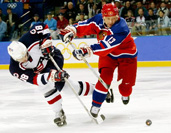Russia shuts out Canada 2-0
The rivalry is a classic, and so was the game. The best hockey game in the Turin Olympics so far ended with a predictable result, too once again Canada couldn't beat Russia when it counts.

Alexander Ovechkin, a National Hockey League player for only a few months, scored the pivotal first goal 90 seconds into the third period and Russia rode Evgeni Nabokov's superb game in goal to a 2-0 quarterfinal victory over gold-medal favorite Canada on Wednesday.
Alex Kovalev sealed the tensely played game by scoring with 23 seconds remaining with Russia on a power play, after Nabokov stood up to the increasingly frantic Canadians by making big save after big save over the final five minutes. He stopped all 27 shots he faced.
Russia now meets Finland in the semifinals Friday. Finland eliminated the United States by winning 4-3 earlier Thursday.
After two tightly-played shutout periods in which the faster Russians controlled the tempo but got few excellent scoring chances against Canada's bigger defenders, Russia finally got the breakthrough goal.
After Chris Pronger couldn't clear the puck from behind the net, Russia's Darius Kasparaitis kept it in the Canadian end by sweeping it toward Viktor Kozlov while off balance. Kozlov gathered it behind the goal line and fed it in front to Ovechkin, who wristed it past Brodeur for his fifth goal in six games.
That was all the Russians needed to beat Canada for the eighth time in their nine Olympics matchups, especially the way the San Jose Sharks' Nabokov was playing in goal.
Under considerable pressure to follow up the gold medal they won in Salt Lake City the first in 50 years for the country that invented the game the Canadians pressed and pressed for the tying goal, but could never get it.
Canada's best chance may have come with 62 seconds remaining when Dany Heatley had the puck in front but couldn't get it past Nabokov as Russian teen forward Evgeni Malkin pulled down Vincent Lecavalier in the crease. Malkin went off for roughing, but Canada didn't get a power play because Lecavalier also went off for roughing after the play.
Seconds after that, Chris Pronger went off for holding with 33 seconds left, and Kovalev scored on the power play sending a disgusted Wayne Gretzky, Canada's executive director, off to the exit before the game ended.
Canada's latest Olympic failure it cannot play for a medal now will raise considerable questions about Gretzky's personnel decisions.
Rather than bringing in Canada's new collection of fresh young scorers, such as Jason Spezza, Eric Staal and Sidney Crosby, Gretzky and coach Pat Quinn stayed with the old reliables such as Joe Sakic, Kris Draper and Shane Doan.
They were rewarded with no goals in three of Canada's last four games and only one period in their last 12 in which they scored.
Russia, by contrast, went with the kids and look what has happened. The Russians were the highest-scoring team in qualifying play with 23 goals in five games, many of them generated by the next generation of Russian hockey the 20-year-old Ovechkin, 19-year-old Malkin and 21-year-old Maxim Sushinsky.
But even with Canada not generating goals, Russia took a curious approach offensively the first two periods despite its visible edge in speed, repeatedly throwing long shots at Martin Brodeur a tactic that almost never works against arguably the sport's best big-game goalie.
Russia generated 27 shots over the first two periods, yet had few excellent scoring opportunities, and Canada actually had better scoring chances while being outshot 16-9 in the second.
Canada nearly scored twice short-handed on one Russia power play, and the insistence on trying to beat Brodeur from the outside meant the Russians got few rebound or follow-up attempts.
Russia and Canada have been hockey's biggest rivals since the famed 1972 Summit Series won by Canada, when Russia was part of the Soviet Union, but the rivalry has been fairly one-sided in the Olympics.
The teams had not met since Russia playing under the banner of the Unified Team following the USSR's breakup won gold in Albertville in 1992.
There was lots of big names from the past in the stands Wednesday, including Gretzky, who starred in the 1987 Soviet Union-Canada Summit Series, Russian Federation sports chief Slava Fetisov and Russian general manager Pavel Bure. After Kovalev scored, Fetisov and Bure hugged each other, bouncing up and down while doing so.
Gretzky couldn't stand to watch any more after Kovalev scored, abandoning his private box with wife Janet Jones and hastily leaving, reports AP.
O.Ch.
Subscribe to Pravda.Ru Telegram channel, Facebook, RSS!


